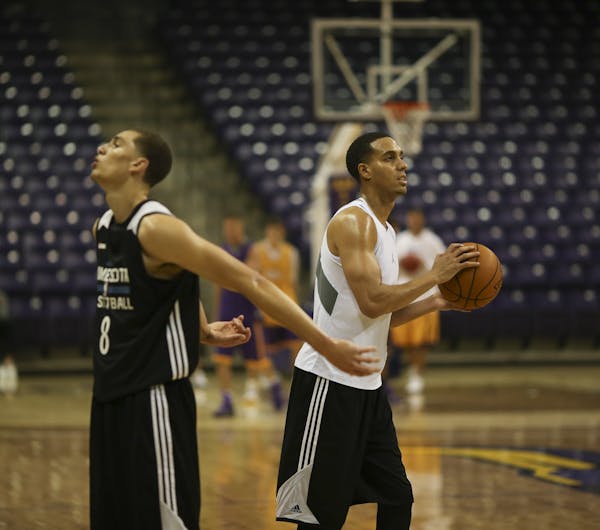The Timberwolves were getting ready Monday for their first preseason game. Meanwhile, an announcement in New York fundamentally changed the NBA game everyone will be playing for the next decade.
The league announced a new broadcast and digital rights agreement with ESPN and TNT, a nine-year deal reportedly worth $24 billion that will begin with the 2016-17 season. It more than triples the value of the previous eight-year, $7.4 billion deal that will expire after next season. With the strokes of a pen it took to sign the deal, the near future of the league was changed, though it's unclear how long it will take to find out just how much.
"What it is is a game-changer for the league," said Flip Saunders, Timberwolves coach, president of basketball operations and minority owner, after Monday's practice. "Adam [Silver, league commissioner] and the NBA did an unbelievable job in negotiating. I think it shows the impact of what our league is doing, from a national perspective. It's one of those things that helps everybody."
According to some analysts, the salary camp that is set for slightly over $63 million for this season could swell to as much as $91.2 million for the 2016-17 season. Which is why, in anticipation of this deal, superstar LeBron James signed a two-year deal — with the 2015-16 season a player option — when he returned to Cleveland. That means he, along with a star like Kevin Durant, could become free agents just when the windfall is scheduled to kick in.
"Our game has never been better," Silver said when announcing the deal.
It remains to be seen how the new deal will be implemented. There already is speculation that the NBA Players Association will opt out of the current labor contract in 2017. Many expect the new deal will be phased in next season to ease the transition.
But the fact is the deal means the new contract is, as Saunders said, good for everyone. For players, for team executives and for owners, who will see the value of franchises continue to rise.
"There is no question that, when you're in a league and you're a coach or a player or an owner — no matter who you are — when you have more money coming in, that's a benefit to people,'' Saunders said. "But there is still a ways to go. Nobody knows yet how they're going to cut the pie or anything else. I guess you'll have to wait and see the dynamics. But, you're going to get so much money, and you have 15 roster spots. So the money gets divided among those players."
So how will that affect the Wolves?
The new TV contract could further complicate the already complex negotiations with Ricky Rubio's agent Dan Fegan on an extension to the rookie contract Rubio signed in 2011. It would seem unlikely Fegan will come down much from his bid to land Rubio a maximum four-year, $62 million contract; any max contract signed now might suffer by comparison once the new deal kicks in. If Rubio doesn't agree to an extension by month's end he will be a restricted free next summer. He could then opt to accept a $6.7 million qualifying offer to become an unrestricted free agent in the summer of 2016.
"It's good for the players, the money," Rubio said of the new deal. "But I just play basketball because I love basketball."
Other Wolves players will be affected, too. Thaddeus Young has a player option of $9.7 million next season. If he chose that option he, too, would be a free agent in 2016.
"This does change the landscape," Young said. "I just found out about [the deal] this morning. It is definitely something I'll talk to my agent about. It has changed a lot of things."
The Associated Press contributed to this report
Anze Kopitar scores in overtime, Kings beat Oilers 5-4 in Game 2 to tie series
Thunder's Holmgren bests Pelicans' Valanciunas in center matchup to help OKC take 2-0 lead
AP PHOTOS: Russian kids ride sticks with a horse's head in hobby horsing competition
Defending champion Golden Knights beat Stars 3-1 to take 2-0 series lead home to Vegas

